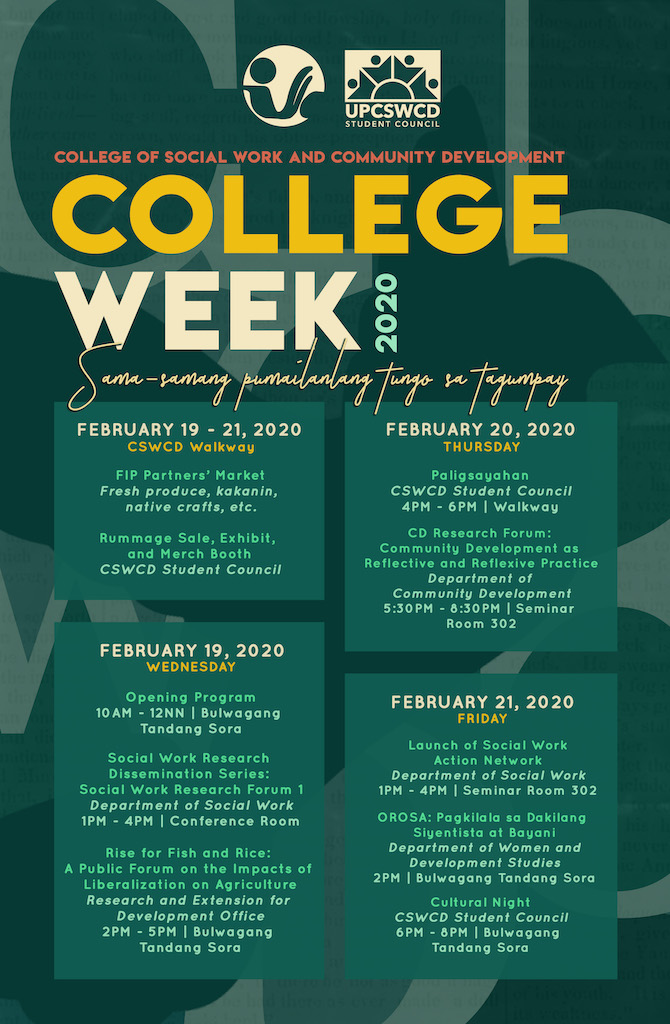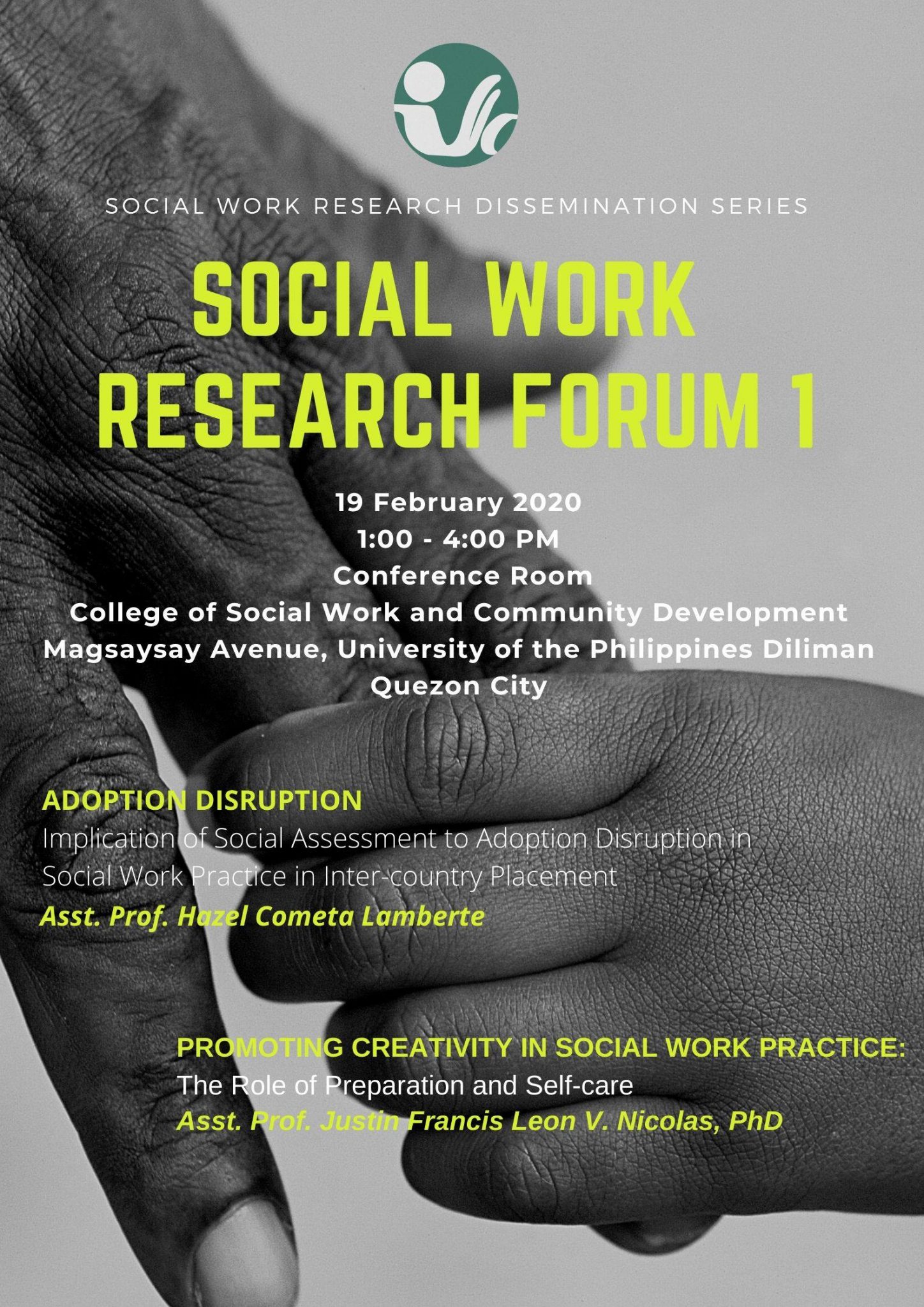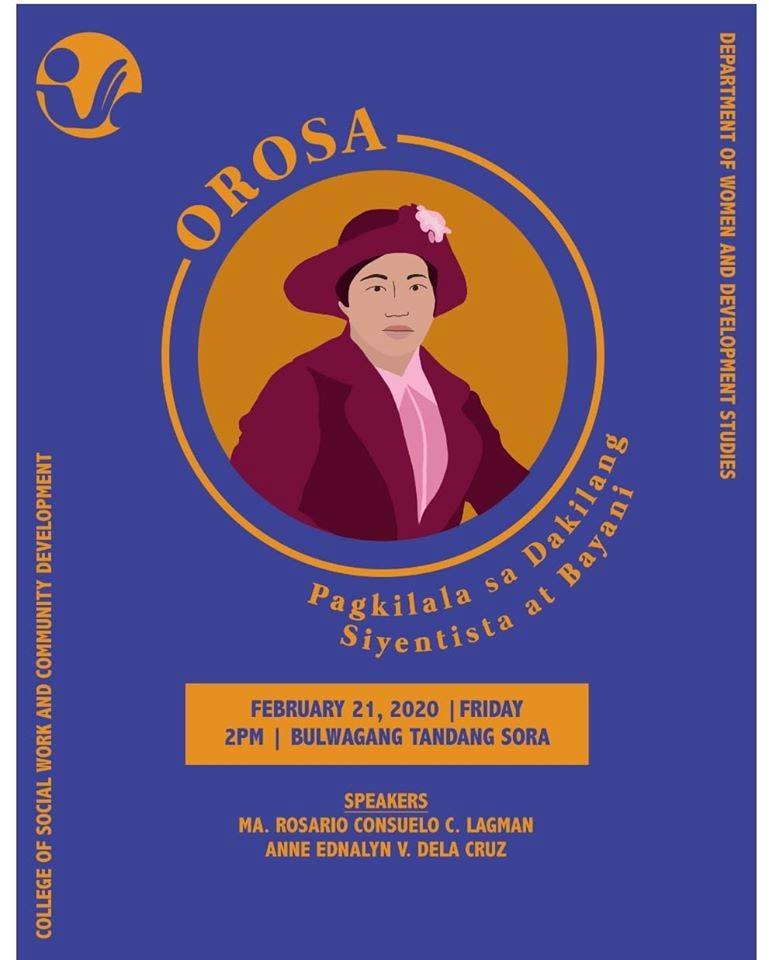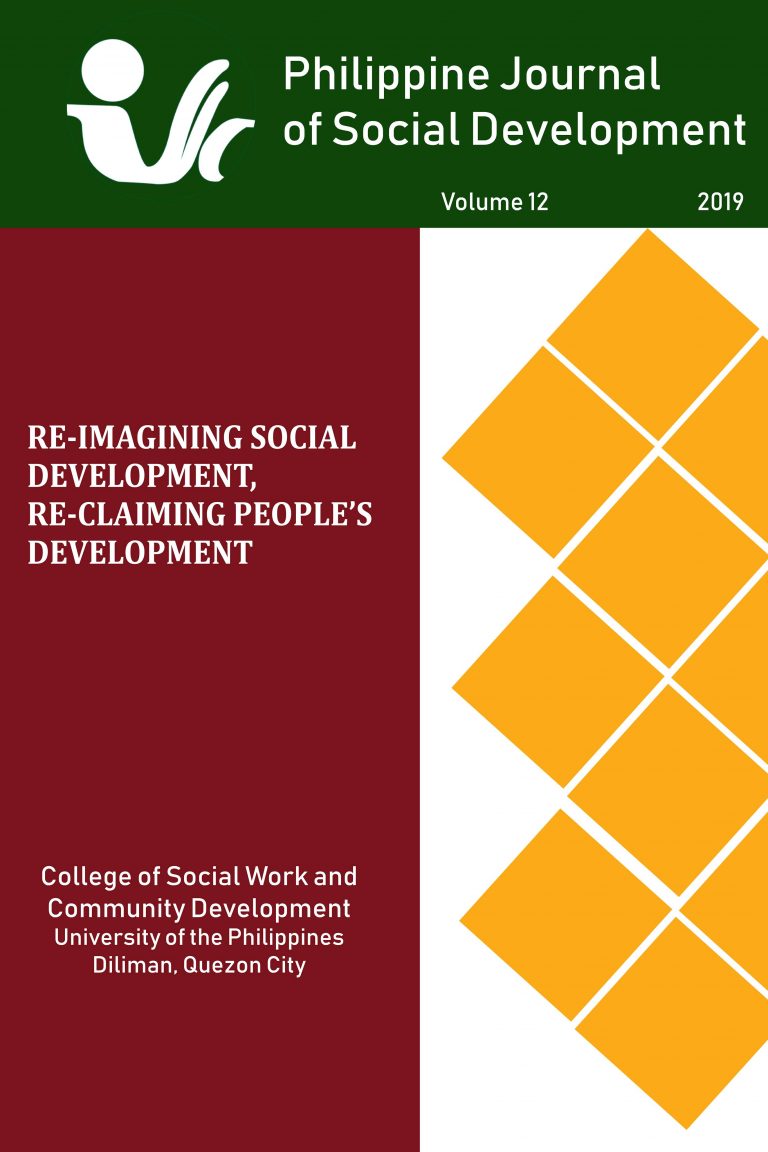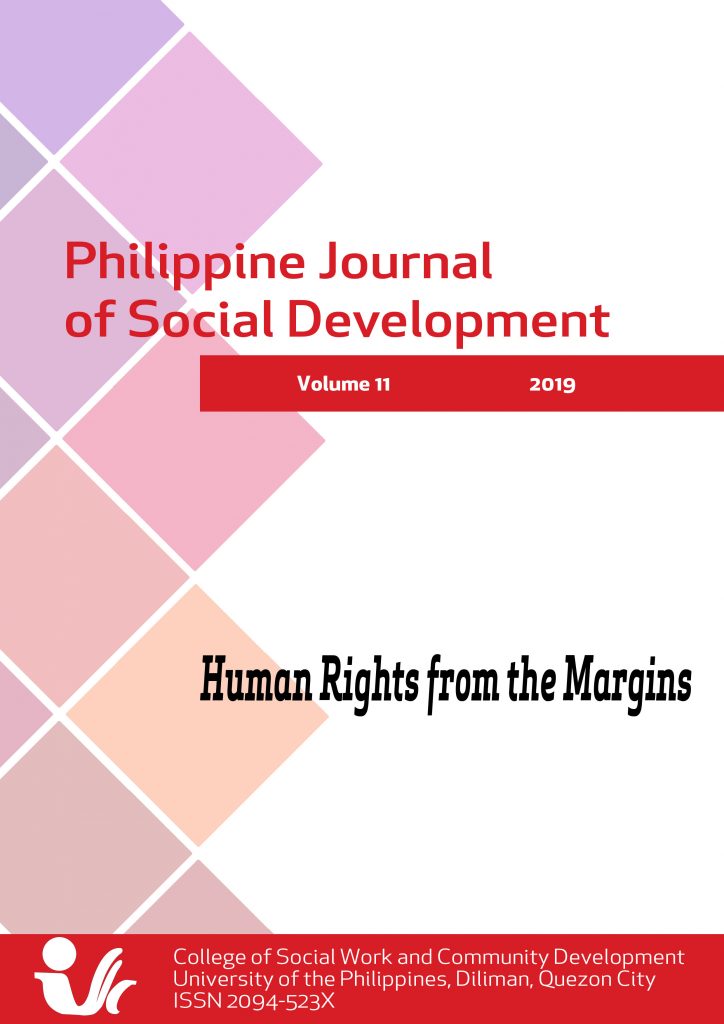Narito ang serye ng mga aktibidad para sa #CSWCDWeek2020. Halina’t makibahagi, makipagdiwang, matuto, at magtanghal.
Author: CSWCD
Social Work Research Forum 1
Abangan sa pagbubukas ng CSWCD Week ang Social Work Research Forum 1. Pakinggan ang pagbabahagi ng pananaliksik nina Asst. Prof. Hazel Cometa Lamberte at Asst. Prof. Justin Francis Leon Nicolas, PhD.
Social Work Research Forum 1
19 February 2020 (Wednesday)
1:00 – 4:00 PM
CSWCD Conference room
Orosa: Pagkilala sa Dakilang Siyentista at Bayani
Inihahandog ng Department of Women and Development Studies (DWDS) ang Orosa: Pagkilala sa Dakilang Siyentista at Bayani.
Abangan sa ika-21 ng Pebrero sa ganap na ika-2 ng hapon sa Bulwagang Tandang Sora ng CSWCD.
Philippine Journal of Social Development Volume 13
Feminist Diversities: Contemporary Issues in Gender and Development in the Philippines
Foreword
The L Words – Lesbian and Labor: Physical and Social Health Impacts of Call Center Work on Lesbian Women in Quezon City, Philippines
Mylene De Guzman
Abstract
The impacts of call center work have been the subject of several studies, but currently, there is paucity of research about lesbian women in the Business Process Outsourcing (BPO) industry. Call center work poses several physical and social health concerns and the worker’s lesbian identity poses yet another challenge in navigating this work environment. This descriptive study used a qualitative approach. Ten (10) lesbian call center workers gave their narratives through semi-structured in-depth interviews in more than a year of doing fieldwork in Eastwood, Quezon City, Philippines. Working in call centers has multiple detrimental effects to health. The participants of the study experienced physical health issues that include voice problems, sleeping problems, unhealthy eating habits, and unhealthy vices such as smoking. Call center work has also affected their social health due to the inflexible and highly variable shifting work schedule, and lesbian call center agents were subject to subtle forms of discrimination in the office. There is a need to look into the effects of call center work on lesbians, as they are inevitably subject to physical and social health impacts, and these impacts are compounded by different forms of discrimination in the workplace.
Keywords: lesbian health, call center work, occupational health, discrimination, Philippines
Philippine Journal of Social Development Volume 12 2019
Issue Editors :
Ma. Theresa V. Tungpalan, Ph.D.
Rowena A. Laguilles-Timog, DSD
Editorial Board :
Sylvia Estrada-Claudio, M.D., Ph.D.
John Erwin S. Bañez
Ma. Linnea V. Tanchuling
Managing Editor : Valerainne R. Lopez
Technical Editor : Melissa Y. Moran
Philippine Journal of Social Development Volume 11 2019
Human Rights from the Margins
Weaving Human Rights in Social Work Practice to Address the Roots of Poverty
Gil I. Espenido
Abstract
Poverty is rooted in the the socio-economic, political and cultural system of the Philippines. Poverty as structural violence is embedded in the system and in the process, continuously violates a wide range of human rights of the Filipinos, from political and civil rights to economic, social, and cultural rights. Social Work, as a profession, has usually paid more attention to human needs than to human rights. With the recognition that at the very core of its existence are conflicts over how competing social-political-economic groups, forces, and classes define, interpret and respond to human needs, the profession has become a contested and highly politicized practice that includes human rights work. With the persistence and gravity of human rights violations, it is imperative for social workers to fully operationalise human rights as a professional value and principle in their practice. This is a path that will contribute to unravelling and addressing the roots of poverty, and engaging in emancipatory, transformative Social Work.
Keywords: poverty, human rights, transformative, social work
The Effects of Death through Violations of Human Rights on the Grieving Family
Jowima Ang-Reyes
Abstract
The violent and unjust death of a loved one leaves a profound and distinct impact on the lives of surviving family members. Moreso, when human rights violations overlay the circumstances of death. The cases of “extrajudicial killings” (EJK) characterizing the current Philippine Drug War, is one example. Human rights violations leading to violent deaths have irrevocable consequences on the family as secondary victims . This review of literature, covering both local and international studies, highlights the significance of various factors affecting the surviving family’s grief, coping, and recovery in the bio-psycho-social-spiritual spectrum. Social workers are challenged not only to sort through micro level concerns and issues surrounding grief, but also to look into the social environment, which influence the depth, duration, and healing of individual grief.
Keywords: grief; grieving families; recovery; human rights
What Makes a Community: Displaced People’s Sense of Community and Human Rights in Resettlement
Raphael M. Ferrer and Devralin T. Lagos
Abstract
Resettlement in the Philippines is a phenomenon that often results to deprivation and displacement of many local communities and threatens human dignity and freedoms. Present literature on resettlement programs and communities often overlooks the subjective dimension of resettled community, e.g. people’s sense of belonging to their place and community, and how these sentiments are linked to the attainment of human rights in resettlement. Using Q-methodology, a hybrid between qualitative and quantitative methods, this article discusses the process and results of a research on the subjective dimensions of a resettled community in a province south of Metro Manila. It underscores how, despite dispossession and deprivation, resettlers are able to build social ties and forge a sense of community that is shaped by the conditions and contexts of resettlement. The sense of community and the attainment of human rights are inextricably linked to one another.
Keywords: resettlement, sense of community, human rights
Rights at Work and Workers’ Resistance in a Luzon Export Zone
Benjamin Velasco
Abstract
Unionization and freedom of association are key labor rights that must be enjoyed by all workers. Yet, they are actively suppressed through various schemes of union avoidance and union busting. Repression of unionization is meant to stop workers from bargaining collectively to better their wages and working conditions. The indifference of the State as represented by the Department of Labor and Employment (DOLE) and the Philippine Economic Zone Authority (PEZA) in the case has led to the outbursts of workers’ protests and strikes escalating the conflict between workers and capitalists. The study explores the state of rights at work in an Ecozone in Luzon through five case studies of the struggles of workers from different factories. Using the human rights-based approach, it examines how duty bearers are protecting, upholding and fulfilling the rights and entitlements of workers as claim-holders. It also reiterates a set of recommendations by the Partido ng Manggagawa that addresses crucial barriers to fulfilling workers rights in the ecozones.
Keywords: export processing zones, unionism, workers, human rights
Doon po sa Amin sa Tundo: May Hirap, May Buhay, May Tambay
Isang Pagkukwento
Venarica B. Papa
Pangiyak: Participatory Video Training para sa mga Lumad
Valerainne R. Lopez, Edgie Francis B. Uyanguren, and Celeste F. Vallejos
Only In Defiance and Resistance can We Regain Our Humanity
Unity Statement
Philippine Copyright ©2019
University of the Philippines Diliman
All rights reserved.
Issue Editors Mary Lou L. Alcid and Nancy E. Parreño
Managing Editors Soleil Anniah C. Santoalla and Leah B. Angeles
Technical Editor Maria Theresa B. Samson
Editorial Board Sylvia E. Claudio, MD, PhD; John Erwin S. Bañez; Teresita V. Barrameda, DSD; Yolanda G. Ealdama; Ma. Linnea V. Tanchuling; and Ma. Theresa V. Tungpalan, PhD
Published by College of Social Work and Community Development University of the Philippines Diliman, Quezon City Philippines
Disclaimer The views and opinions expressed in this journal are solely the authors’ and do not necessarily reflect those of the College of Social Work and Community Development.
The implications of tertiary and VocTech education of former program beneficiaries
The implications of tertiary and VocTech education of former program beneficiaries
Caganan, Ria Marie
2015
Towards a more inclusive society: a participatory research on disability and well being
Towards a more inclusive society: a participatory research on disability and well being
Geronimo, John Anthony
2015

